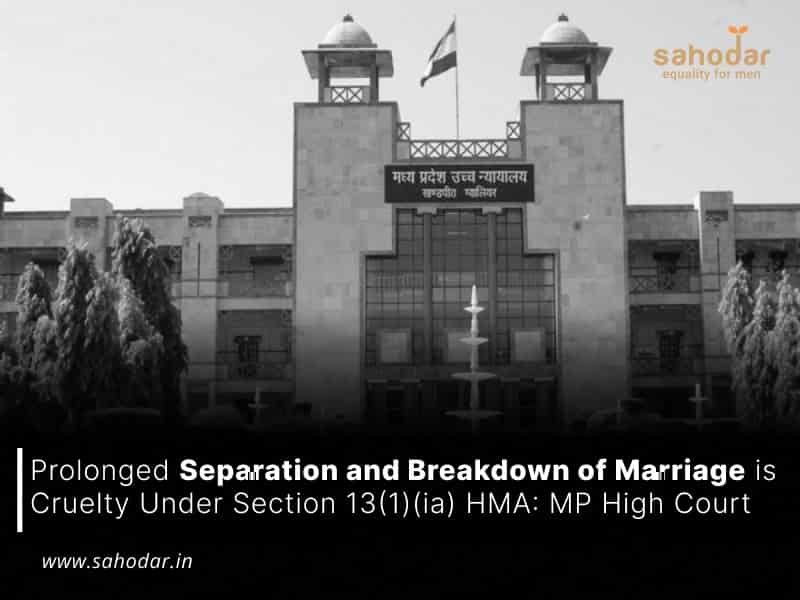The Madhya Pradesh High Court held that prolonged separation, lack of cohabitation, irreparable breakdown of marriage, and bitterness between spouses qualify as ‘cruelty’ under Section 13(1)(a) of hindu marriage act (HMA), 1955.
“Where the marital relationship has broken down irretrievably, where there is a long separation and absence of cohabitation (as in the present case for the last 12 years), then continuation of such marriage would only mean giving sanction to cruelty with each is inflicting on the other”, a bench of Justice Anand Pathak and Justice Hirdesh remarked while granting divorce to a husband.
The Court upheld an appeal by the husband challenging a family court’s rejection of his petition under Section 13 of the Hindu Marriage Act, seeking a divorce decree on grounds of cruelty, concealment of the respondent’s mental condition, and desertion.
The case in brief
The appellant-husband sought a divorce from the respondent-wife, alleging that their marriage, solemnized in February 2008, was affected by the wife’s mental health issues. He claimed she exhibited irrational behavior, including hearing voices, experiencing hallucinations, and losing her ability to reason.
The husband claimed that despite efforts to address her condition, including seeking assistance from her parents, there was no improvement. After the birth of their two children, the wife was taken to her parents’ home in June 2012, but her condition remained unchanged for the next five years.
Consequently, he filed for divorce in the Family Court on grounds of cruelty and desertion, asserting that her condition caused him humiliation and mental anguish.
The Family Court proceeded ex parte against the respondent due to her non-appearance but dismissed the appellant’s divorce petition in January 2018.
On hearing the appeal, the division bench observed that the respondent had been living separately from the appellant since 2012 and had not contested the evidence presented by the appellant regarding her abnormal behaviour. As a result, there was no basis to doubt the appellant-husband’s testimony.
The Court highlighted the appellant’s testimony, which described the wife-respondent claiming that someone was following and spying on her, hearing screams, and seeing a woman’s body—none of which had actually occurred.
According to the appellant, her erratic and irrational behaviour disrupted his life. She would stay awake at night, wander around, talk incessantly, and sometimes became oblivious to her clothing. She would also throw objects and had lost her ability to think, remember, or reason.
The Court further observed that the parties had been living separately since 2012, with their marital bond completely broken and irreparable. It concluded that continuing the relationship constituted cruelty for both parties and, therefore, must come to an end.
“The long separation, absence of cohabitation, the complete breakdown of marriage and the existing bitterness between the two, has to be read cruelty under Section 13(1)(ia) of the 1955 Act,” the Court observed.
In light of these circumstances, the Court held that the Family Court erred in rejecting the appellant’s divorce petition by disregarding the unrebutted evidence.
Accordingly, the impugned judgment and decree of the Family Court, Gwalior, were set aside. The appeal was allowed, the appellant’s divorce petition was granted, and the marriage between the appellant and the respondent was dissolved.
However, considering the appellant’s occupation as a labourer and the financial condition of both parties, the Court directed the husband to pay Rs. 2 lakhs to the respondent-wife as permanent alimony.

